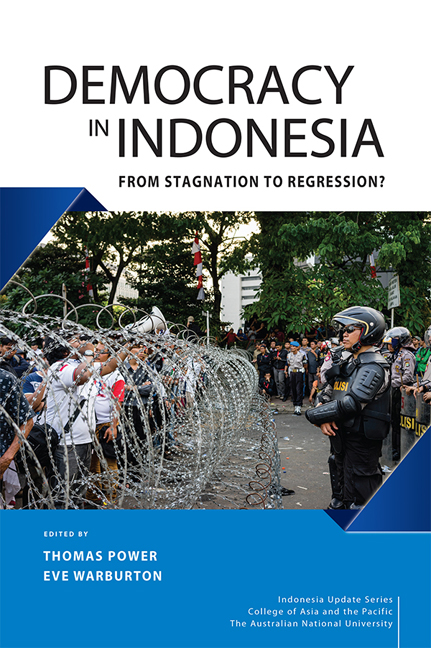Book contents
- Frontmatter
- Contents
- Tables and Figures
- Contributors
- Foreword
- Acknowledgments
- Glossary
- 1 The decline of Indonesian Democracy
- Part 1 Historic al and Comparative Perspectives
- Part 2 Polarisation and Populism
- Part 3 Popular Supp ort for Democracy
- Part 4 Democratic Institutions
- Part 5 Law, Security and Disorder
- Index
- Indonesia Update Series
Foreword
Published online by Cambridge University Press: 24 November 2020
- Frontmatter
- Contents
- Tables and Figures
- Contributors
- Foreword
- Acknowledgments
- Glossary
- 1 The decline of Indonesian Democracy
- Part 1 Historic al and Comparative Perspectives
- Part 2 Polarisation and Populism
- Part 3 Popular Supp ort for Democracy
- Part 4 Democratic Institutions
- Part 5 Law, Security and Disorder
- Index
- Indonesia Update Series
Summary
Verily, along with every hardship is relief
Qur’an 94:6
There is a growing consensus among scholars that Indonesia's democracy is in decline, although, in fairness, many new and established democracies around the world are suffering the same fate. I am not going to challenge the consensus. Democracy in Indonesia is indeed declining.
The Australian National University appropriately picked democracy as the main theme for its Indonesia Update conference in September 2019. Since Indonesia had just held a general election in April, it was important to reflect on how far the country had come in its march to democracy these past two decades. These were the fifth democratic, free and fair legislative elections in post-Suharto Indonesia, and the fourth direct presidential election, and were widely recognised as remarkable achievements for a nation with a large and diverse population. Indonesia shines when compared to many of its neighbours, including Thailand and the Philippines.
But is Indonesia's democracy following the same path taken by many other democracies in Southeast Asia and beyond? The next few years will tell.
I did have some reservations to the title of the Indonesia Update 2019 ‘From stagnation to regression? Indonesian democracy after twenty years’ and I made my feeling known in an opinion article I wrote for the Jakarta Post in July. Based on my own reading, the title suggested there was only one other possible course for Indonesia's democracy, besides stagnation: regression. Although the title is framed as a question, it stills portrays a bleak future and allows little, if any, possibility for democracy in Indonesia to go in the other direction: progression. This may be true and indeed many analyses, some of which were highlighted in this conference, suggest things are likely to get worse.
The optimist in me, however, refuses to believe that this is the case. As a journalist who has reported and written about Indonesia's political development over the past 36 years, I cannot accept that this backsliding of democracy is irreversible. Over the course of time, going back to the last decade of the Suharto years, I have seen many setbacks to democracy; but the overall trajectory has always been to move forward.
- Type
- Chapter
- Information
- Democracy in IndonesiaFrom Stagnation to Regression?, pp. xii - xvPublisher: ISEAS–Yusof Ishak InstitutePrint publication year: 2020

